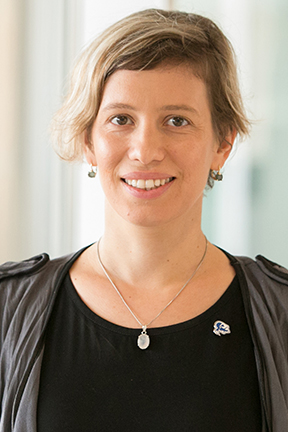What Great Minds Can Do: Ruth Tsuria
Ruth Tsuria, Associate Professor/Director of Graduate Studies
South Orange, New Jersey
"Communication always matters because, as I argue in my research, we use words to build our worlds. This is even truer when we think about our professional and social future. Media scholars say that we are living in an 'information age,' meaning that the currency of our society is information, which is usually transmitted through communication. Therefore, understanding how to communicate well and how communication shapes our world are key for those of us who want to build our future."

In fact, Tsuria recalled getting just as emotional as her pupils upon watching them graduate last year.
"I was actually shaking from joy and excitement as I hooded my students," Tsuria said. "It was one of the most precious moments in my life."
That passion for shaping the next generation of scholars is why she finds being a professor so rewarding. Tsuria, who describes her role as being both a mentor and a teacher, loves seeing students overcome challenges to achieve things they never imagined they could do. She also enjoys observing them as they discover their passions and find new ways of thinking through the course study. One of her favorite memories is when a student declared, "I have completely changed my view of the world!" in class while discussing Nietzsche's beliefs on subjectivity.
The Communication master's program in particular is an ideal place to learn and grow, according to Tsuria. While many other institutions focus only on academic thinking or professional development, she said the M.A. program ties theory to practice by offering a solid theoretical background and extensive career preparation. By the time they are ready to graduate, students will be exceptional communicators and critical thinkers with the skills necessary to thrive in life.
Getting to that point is not easy, though. As Tsuria put it, the program requires students to invest their "time, tears and sweat" in their classes and projects. In the end, they will walk away with a thorough education they partially crafted through the choice of their thesis topic — but they will have put in the intensive effort to do so.
"Creating your path is hard work," Tsuria said. "This is not something you can do one night a week, this is something that you will have to dedicate time and energy to. After all, it is your future."
Of course, Tsuria is always ready to lend her support and expertise. And she certainly has a lot of knowledge to share. The professor is a rising star in the study of how digital media, religion and feminism impact each other, most recently earning an Emerging Scholar Award from the Religion in Society Research Network.
She is eager to share her passion for communication — a subject she feels is vital for everyone to understand. "Communication always matters because, as I argue in my research, we use words to build our worlds," Tsuria said. "This is even truer when we think about our professional and social future. Media scholars say that we are living in an 'information age,' meaning that the currency of our society is information, which is usually transmitted through communication. Therefore, understanding how to communicate well and how communication shapes our world are key for those of us who want to build our future."
But the way people communicate today is changing all the time thanks to the advent of social media and other technologies. As a result, Tsuria constantly updates her courses using the latest research and what she learns at academic conferences. She also seeks to create cutting-edge research that could inform her classes. On top of that, she uses her experiences writing, receiving feedback and even getting rejected to help students with their own papers.
Clearly, students are in knowledgeable hands when working on their theses. And while the idea of completing a 50- to 100-page research paper may sound daunting, Tsuria pointed out that the authors will benefit from the experience. For one, she emphasized that students delve deeply into topics they are interested in while honing skills like critical thinking, editing and resilience. The finished product will also look impressive to employers when students start job hunting.
As a matter of fact, she said just adding a master's degree to one's resume speaks volumes to potential bosses. "It shows an amount of seriousness about research, about achieving goals and about being dedicated to self-improvement," Tsuria said. "It's a jumping board for the next big thing, meaning that you are capable of doing bigger things."
And when her students do find success, Tsuria surely will be filled with pride.
This profile was written by Sean Quinn, a Graduate Assistant for Graduate Studies within the College of Development, Culture, and Media and an M.A. in Public Relations student.
Highlights
- 2018 Emerging Scholar Award: Religion in Society
- 2017 Tiffany Hunnicutt Award, Outstanding Graduate Student Award
- 2017 STAR Award, Dissertation Writing Fellowship - College of Liberal Arts, Texas A&M University
- 2016 George Bush Foundation Graduate Student Travel Grant
- 2016 Dissertation Fellowship Award - Texas A&M Women and Gender Studies
- 2015 Top Graduate Paper Award - Communicating Diversity Student Conference
- 2014 The Association of Jewish Studies (AJS) Graduate Student Travel Grant
- 2012 Oticon Fonden, Graduate Student Award

